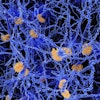
A new study sheds light on the significance of the Mucin 6 (MUC6) gene in late-onset Alzheimer's disease (LOAD), helping to fill gaps left by prior genetic studies, researchers recently reported in the Journal of Neuropathology & Experimental Neurology.
The discovery came through the analysis of data from more than 10,000 people involved in the Alzheimer's Disease Sequencing Project and included a separate cohort of autopsied subjects with digital pathology data.
Dr. Peter Nelson, PhD, director of neuropathology at the University of Kentucky, and colleagues discovered a genetic variation within a segment of the MUC6 gene and located immediately downstream from another gene called Adaptor Related Protein Complex 2 Subunit Alpha 2 (AP2A2) (J Neuropathol Exp Neurol, November 4, 2019).
Using polymerase chain reaction (PCR) analyses of DNA samples, they correlated genetic features with the severity of Alzheimer's-type brain pathology. In addition, subjects with longer MUC6 variable number tandem repeat (VNTR) regions had lower AP2A2 expression.
Genome-wide association studies have not told the whole story about heritable factors in Alzheimer's disease; for example, some left out rare gene variants, the authors noted. In fact, past studies have suggested that many genetic risk factors associated with late-onset Alzheimer's disease -- perhaps one-half -- remain unidentified, according to Nelson.
"Correspondingly, a lot of the genome has not been analyzed due to the complexity of the human genome and shortcomings in sequencing technology," he commented by email.
The study suggests a strong association between the variant and the disease, but the sample size was small and results need to be replicated in other groups, according to Nelson.



















